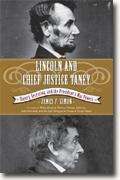Lincoln and Chief Justice Taney
James F. Simon
book reviews:
· general fiction
· chick lit/romance
· sci-fi/fantasy
· graphic novels
· nonfiction
· audio books
· author interviews
· children's books @
curledupkids.com
· DVD reviews @
curledupdvd.com
newsletter
win books
buy online
links
home
for authors
& publishers
for reviewers

 |
Lincoln and Chief Justice Taney: Slavery, Secession, and the President's War Powers James F. Simon Simon & Schuster Hardcover 336 pages November 2006 |
|
Most Americans know the name of Abraham Lincoln, but many people do not know that of Roger Brooke Taney, the fifth Chief Justice of the United States and the first Roman Catholic to reach this exalted position. This book by James F. Simon, the Martin Professor of Law and Dean Emeritus at New York Law School, is more about Taney than Lincoln, zigzagging between their stories until 1860, when Lincoln is elected president and Taney is still the Chief Justice.
Taney studied law in Annapolis and was admitted to the bar in 1799, later serving in the Maryland legislature. Taney’s views on slavery, an institution he would be required to make legal decisions concerning as Chief Justice, were that he personally disapproved of it but considered legal. He, like others, hoped that slavery would eventually just die out. He supported the idea to send former slaves back to Africa and found a colony there for them, and he defended an abolitionist in 1819. Taney’s understanding of the U.S. Constitution led him to believe that the Federal government could not abolish slavery, that it was up to the individual states to abolish slavery - which some states had done before the Civil War. Taney in 1827 was appointed the Attorney General of Maryland and became involved in the election of Andrew Jackson, who appointed him Attorney General of the United States. Jackson tried to get Taney appointed first as his Secretary of the Treasury and later as an associate justice on the Supreme Court, but Jackson had too many enemies in the Senate by then, in 1834. All seemed finished for Taney at this point. On July 6, 1835, Chief Justice John Marshall died and Jackson decided to nominate Taney for the post. Things in the Senate had changed by then, and Taney was appointed as the fifth Chief Justice of the United States, serving for over 28 years from 1836 to 1864. Taney was not always part of the majority in his court’s decisions, but he most famous decision of the Taney court - one which Taney wrote the majority decision for - was the Dred Scott case. Because he and the majority of the justices decided against Dred Scott, declaring him a slave rather than a citizen who could go to court, the Supreme Court lost prestige and honor in the Northern states. This also affected their influence during the Civil War. Taney was seen as a traitor since he supported slavery in his court decisions and also thought it was permissible for a state to peacefully secede from the Union. President Abraham Lincoln and others in Washington as well as many people in the North did not agree with him. Simon presents Abraham Lincoln as a shrewd politician who studied his opponent and the issues. Abraham Lincoln at first did not want to free the slaves; only as the Civil War continued did he agree to that. His main purpose in the War was to preserve the Union. He did not think that blacks were equals to whites, but he did not think slavery was morally correct, either. Taney did not think slavery was morally correct, either, but he could not find it unconstitutional. James Simon’s book is recommended to Civil War enthusiasts, those interested in the biographies of judges and presidents, and those interested in legal history. James F. Simon is the author of What Kind of Nation: Thomas Jefferson, John Marshall, and the Epic Struggle to Create a United States (2003), The Center Holds (1999), Antagonist (1989), Independent Journey (1981), The Judge (1976) and other books and articles. Originally published on Curled Up With A Good Book at www.curledup.com. © Br. Benet Exton, O.S.B., 2006 |
|
|
|
 Click here to learn more about this month's sponsor! |
|
| fiction · sf/f · comic books · nonfiction · audio newsletter · free book contest · buy books online review index · links · · authors & publishers reviewers |
|
| site by ELBO Computing Resources, Inc. | |
 Taney was born on March 17, 1777 in Maryland. His forebears were members of the Church of England, but a later generation converted to Roman Catholicism. Simon says in his introduction that Taney was a devout Catholic, but not so devout that he wouldn’t marry outside of the Church to Anne Key, the sister of Francis Scott Key, the composer of our national anthem. His six children were raised as members of his wife’s church.
Taney was born on March 17, 1777 in Maryland. His forebears were members of the Church of England, but a later generation converted to Roman Catholicism. Simon says in his introduction that Taney was a devout Catholic, but not so devout that he wouldn’t marry outside of the Church to Anne Key, the sister of Francis Scott Key, the composer of our national anthem. His six children were raised as members of his wife’s church.